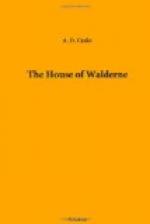And to Hubert he said one day:
“This hardly represents your best work, my son, you did better even yesterday.”
Hubert tossed his head.
“Martin cares only for books—I want to learn better things; he may be a monk, I will be a soldier.”
His literary acquirements, unusual in the time, increased his influence and reputation.
“And dost thou know,” said a deep voice, “what is the first duty of a soldier?”
It was the stern figure of the earl who stood unobserved in the doorway of the library.
Hubert hung his head.
“Obedience!”
“And know this,” added the speaker, “that learning distinguishes the man from the brute, as religion distinguishes him from the devil.”
The two medieval boys, with the story of whose lives this veracious chronicle concerns itself, were indeed singularly unlike in their tastes and dispositions.
Martin seemed destined by nature for the life of the cloister, the home of learning and contemplation in those days, wherein alone were libraries to be found, and peaceful hours to devote to their perusal. He learned his lessons with such avidity as to surprise and delight his teacher, his leisure hours were spent in the library of the castle—for Kenilworth had a library of manuscripts under Simon de Montfort—a long low room on an upper floor, one end of which was boarded off as a chamber for the chaplain, who was of course also librarian. And again, he evinced a joy in the services of the castle chapel which sufficiently marked his vocation. The earl was both devout and musical, and the solemn tones of the Gregorian Church Modes were rendered with peculiar force by the deep voices of the men, for which they seemed chiefly designed. As Martin listened, he became aware of sensations and ideas which he could not express—he wept for joy, or trembled with emotion like Saint Augustine of old {8}.
Then again, Sunday by Sunday, the chaplain was like a living oracle to him, as to many others. The ascetic face became beautiful with a beauty not of this earth—“his pallor,” said they, “became of a fair shining red” when he spoke of Christ or holy things, while anon his thunder tones awoke an echo in the heart of many as he testified against cruelty and wrong, of which there was no lack in those days.
Under his influence Martin was becoming moulded like pliant wax, the boy of the greenwood was losing all his rusticity, and yet, retaining his keen love of nature, was learning to look beyond nature to nature’s God. At times Martin was very weary of Kenilworth, and almost wished himself back in the greenwood again, so little was he in sympathy with the companions whom he had found.




